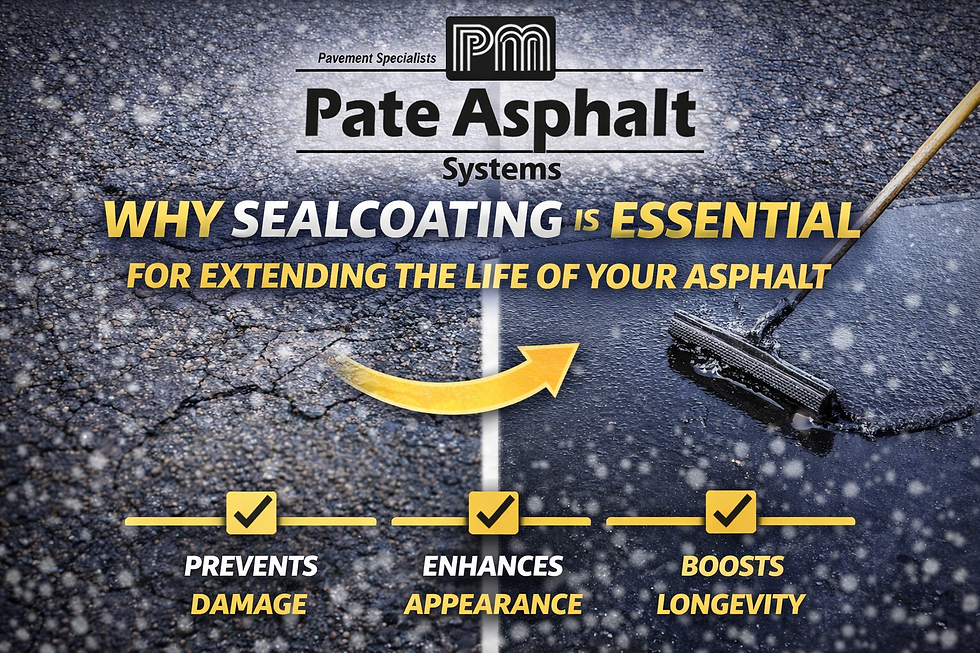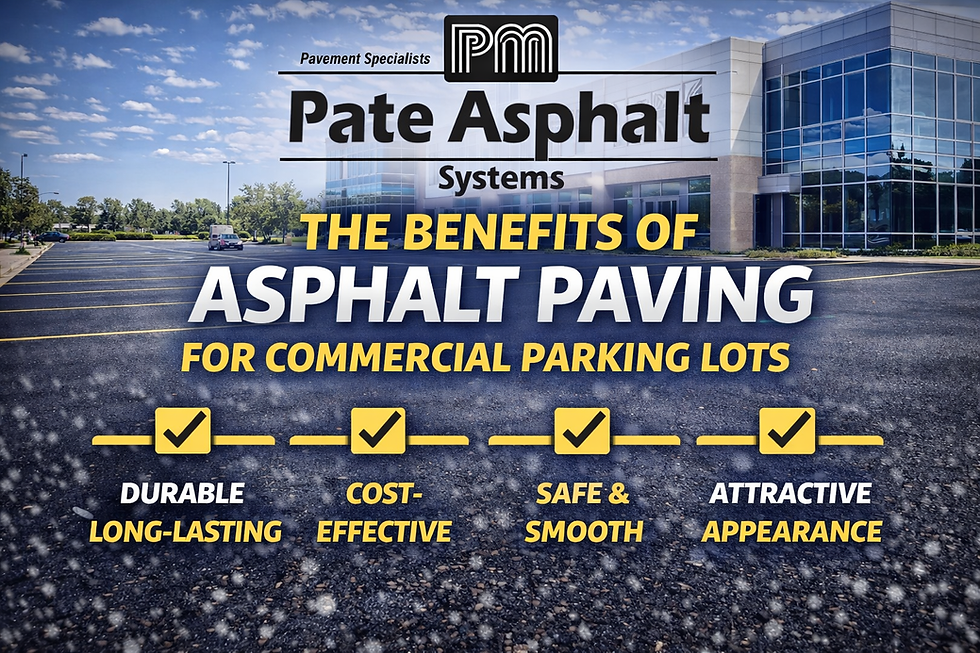Asphalt vs. Gravel: Which Driveway Surface is Right for Rural Iowa Properties?
- Inspired Connection Agency
- Sep 27, 2025
- 5 min read
For homeowners and farmsteads across rural Iowa, the driveway is more than just a place to park cars. It’s the first impression of your property, a key factor in accessibility year-round, and an important investment in both function and appearance. Choosing the right material—most often between asphalt and gravel—is a decision that impacts cost, maintenance, and long-term durability.
At Pate Asphalt, we’ve helped thousands of Iowa families and farmers weigh the pros and cons of both options. This article will break down the science, economics, and practicality of asphalt vs. gravel so you can decide what’s best for your property.
Understanding Rural Iowa Driveway Needs
Iowa’s landscape presents unique challenges:
Harsh Winters: Frequent freeze–thaw cycles (averaging 30–60 events per year) can damage poorly designed driveways.
Heavy Equipment: Many rural properties use tractors, grain trucks, and trailers—vehicles that place higher stress on the surface.
Drainage Concerns: With rolling terrain and seasonal rainfall, proper grading is critical to prevent washouts or rutting.
The right surface must withstand these conditions while still offering cost-effectiveness and curb appeal.
Asphalt Driveways: Pros and Cons
Asphalt is one of the most popular driveway materials in Iowa, especially for homeowners who want a smooth, durable, and long-lasting surface.
Advantages of Asphalt
Durability and FlexibilityAsphalt is engineered to flex with Iowa’s freeze–thaw cycles, reducing cracking compared to rigid materials. With proper maintenance, asphalt driveways can last 20–30 years.
Smooth SurfaceAsphalt provides a clean, smooth finish ideal for walking, snow removal, and vehicles. Unlike gravel, there are no loose stones that migrate into the yard or road.
Low MaintenanceRegular sealcoating every 3–5 years protects asphalt from UV rays and moisture, extending its life span. Small cracks can be filled quickly and affordably.
Curb AppealA paved asphalt driveway boosts property value and enhances the overall look of a home or farmstead.
Snow Removal EfficiencyAsphalt heats up faster under sunlight, helping snow and ice melt more quickly. Plowing is also smoother compared to gravel.
Disadvantages of Asphalt
Upfront Cost: Asphalt requires a higher initial investment than gravel.
Heat Sensitivity: In extreme summer heat, asphalt can soften slightly, though modern mixes mitigate this issue.
Maintenance Commitment: While relatively low, it still requires scheduled upkeep like sealcoating.

Gravel Driveways: Pros and Cons
Gravel remains a common choice for many rural Iowa properties due to its affordability and rustic appearance.
Advantages of Gravel
Low Initial CostGravel driveways cost significantly less upfront than asphalt—sometimes as little as 1/5th of the price depending on size.
Easy InstallationA gravel driveway can often be installed in a day or two, making it an attractive option for large rural properties.
Rustic AestheticFor farmsteads or country homes, gravel driveways offer a traditional look that blends into the rural landscape.
PermeabilityGravel allows water to drain through, reducing runoff and lowering the chance of pooling.
Disadvantages of Gravel
Frequent Maintenance: Gravel must be re-graded regularly and replenished every 1–3 years as stones scatter or sink.
Snow Removal Challenges: Plowing a gravel driveway often removes rocks along with the snow, leading to extra work in spring.
Dust and Dirt: Gravel produces dust in dry months and mud in wet seasons.
Vehicle Wear: Loose gravel can cause more wear on tires and increase the risk of chips to paint.
Testimony: A Farmer’s Perspective
"When we first bought our acreage outside Cedar Rapids, we went with gravel because it was cheaper upfront. But after five years of constant re-graveling, grading, and fighting mud every spring, we decided to switch to asphalt with Pate Asphalt. Best decision we made. The driveway holds up to our grain trucks, it’s easier to plow in winter, and it looks so much cleaner pulling up to the house."— Sarah L., Linn County Farmer
Supporting Statistics
According to the National Asphalt Pavement Association, 94% of paved roads in the U.S. are surfaced with asphalt, a testament to its durability and cost-effectiveness.
A University of Minnesota Extension study found that properly maintained asphalt driveways lasted 20–30 years, while gravel required re-grading at least twice a year and full replenishment every few years.
Home appraisers report that paved driveways can add 5–10% to a property’s value, an important consideration for rural homeowners thinking about resale.
Side-by-Side Comparison
Feature | Asphalt Driveway | Gravel Driveway |
Initial Cost | Higher ($3–$6 per sq. ft.) | Lower ($1–$2 per sq. ft.) |
Maintenance | Sealcoat every 3–5 years; crack filling | Re-grading, weed control, re-graveling |
Lifespan | 20–30 years with maintenance | 5–10 years with frequent upkeep |
Snow Removal | Easy to plow, melts ice faster | Rocks displaced during plowing |
Curb Appeal | Clean, smooth, boosts property value | Rustic but less polished |
Durability | Handles heavy loads with proper base | Can rut under heavy trucks/tractors |
Environmental Impact | Recyclable, can be designed porous | Natural but contributes dust/runoff |
Which Surface Is Right for Your Iowa Property?
The choice depends on your priorities:
Choose Asphalt If…
You want long-term durability with less frequent maintenance.
Snow removal is a major concern.
Boosting property value and curb appeal is important.
You regularly drive or park heavy vehicles.
Choose Gravel If…
You want the lowest upfront cost.
You don’t mind regular upkeep and re-graveling.
A rustic, country aesthetic is preferred.
The driveway is rarely used or is very long and cost-sensitive.
Maintenance Tips for Each Surface
Asphalt Driveways
Sealcoat every 3–5 years.
Fill cracks promptly to prevent water infiltration.
Ensure proper drainage away from the base.
Gravel Driveways
Re-grade at least once per year to smooth ruts.
Add new gravel every 1–3 years.
Install proper drainage ditches to reduce washouts.
The Pate Asphalt Difference
At Pate Asphalt, we understand the unique challenges of rural Iowa properties. Whether you’re paving a long farm driveway or resurfacing a residential entrance, we engineer asphalt solutions built for Iowa’s climate. Our team uses custom mixes designed for freeze–thaw cycles, ensuring your driveway lasts decades with the right maintenance.
For customers who still prefer gravel, we also provide guidance on grading, base preparation, and long-term maintenance planning. Our goal is to give rural Iowans the knowledge and support to make the best choice for their property.
Conclusion
When deciding between asphalt and gravel, rural Iowa property owners must consider more than just the upfront cost. Asphalt offers long-term durability, ease of snow removal, and added property value—making it a smart investment for many homeowners and farmsteads. Gravel, on the other hand, provides a lower initial cost and rustic charm but requires more frequent maintenance.
By weighing the pros and cons, you can select the driveway surface that aligns with your lifestyle, budget, and property needs. And when you’re ready to invest in a driveway built for Iowa’s seasons, Pate Asphalt is here to help.
Call to Action:Ready to explore asphalt for your rural Iowa driveway? Contact Pate Asphalt today at (319) 393-4812 or visit www.pateasphalt.com for a free consultation.





Comments